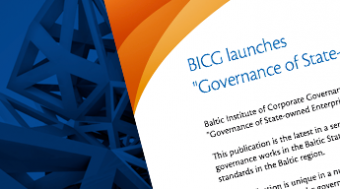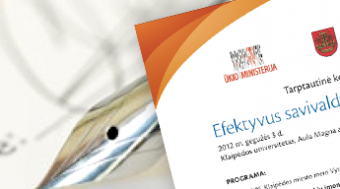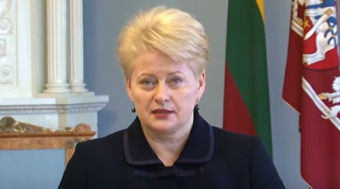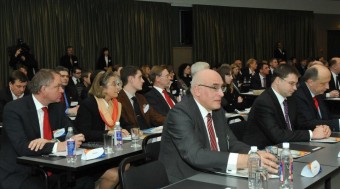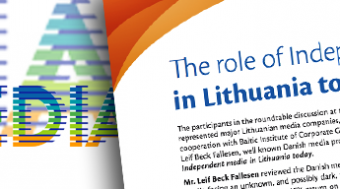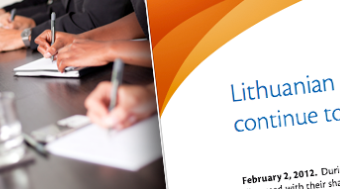The participants in the roundtable discussion The role of Independent media in Lithuania today, which took place at the Swedish residence on the 6th of February, 2012, represented major Lithuanian media companies, journalists, editors and government institutions. In cooperation with the Baltic Institute of Corporate Governance, ambassador Cecilia Ruthström-Ruin invited Mr. Leif Beck Fallesen, well known Danish media profile, to chair...
The participants in the roundtable discussion The role of Independent media in Lithuania today, which took place at the Swedish residence on the 6th of February, 2012, represented major Lithuanian media companies, journalists, editors and government institutions. In cooperation with the Baltic Institute of Corporate Governance, ambassador Cecilia Ruthström-Ruin invited Mr. Leif Beck Fallesen, well known Danish media profile, to chair the event.
Mr. Leif Beck Fallesen reviewed the Danish media landscape and the current situation with printed media facing an unknown, and possibly dark, future. Online media are indeed growing rapidly, but produce less economic value. 15% return on turnover was the benchmark for most business and should be applied also to media. Generally, online media is gravitating towards comments and opinions rather than factual news reporting. Mr. Fallesen touched the Danish example of state support to newspapers; numerous questions followed on that topic. Indeed the state support schemes were costly and it’s including standards sometimes pose ethical problems, but still the political backing was firm from all the parties.
The participants of the seminar illustrated different opinions on the new income – and honorary – tax regulations in Lithuania and its impact on media publishers. One attendee stressed that this was, from a principle point, correct and fair since it levelled out differences between media and other businesses. On the other side this new regulations made it so costly to engage professionals outside journalism, that it would seriously hamper media possibilities to attract highly profiled analysts and columnists. The removal of VAT breaks for printed media posed a severe threat to some of the publishers, so did the decision by the Lithuanian Post to change tariffs during the daily newspapers subscription terms.
The crisis for printed media in general, and particularly in Lithuania, hard hit by economic downfall in 2008, did not only bring turmoil and destruction to the media landscape. We are now discussing quality and how to get people to pay for that and this is in fact a positive outcome, one participant acknowledged.
One journalist stressed the danger that non-profitable media pose to profoundly market oriented media. The existence of numerous media outlets that are sustaining losses for tens of years does not only obstruct the competition, but it also poignantly illustrates the value some owners see in using media as a colporteur for their own interest. Foreign interests are keen to engage in Lithuanian media, especially with upcoming elections, stressed one participant referring to Russia.
The presence of EU-funds for media can add important income to media outlets, but it also imposes new threats of corruption, since this support should be distributed and administrated. This support can, in addition to above mentioned non-profitable media, pivot the market in favour for non sustainable business models. Open tenders for EU-support can be a solution and was discussed.
The State Media Support Fund was found by most participants as insufficient and inadequately managed. The value of keeping non-competitive, and in terms of circulation minor, papers in the market by using state support has drawbacks.
The role of Scandinavian investors was examined, and one media representative stressed that they should not be mystified, but rather seen as rational and demanding business interests. The responsibility of fostering a sound culture within the media business, lies mainly in the media itself, one attendee stressed. Further on the legal framework for media, the regulatory bodies could be improved and discussed in an apolitical manner. The need for a follow up on the discussions was recognised by the seminar participants. To address the shortcomings identified by the discussion a platform for dialogue is essential, something that was not existing in Vilnius today.
Major items for further discussions could be: *State support for media, *EU-fund distribution reforms, *legal framework / self regulation *Establishment of a structured discussion both between media and government and within media itself.
Mr. Beck Fallesen concluded the meeting by stating that the value of media to whole society has to be recognised by both state and private businesses. Any kind of state support can not substitute sustainable media outlets working on sound models. For Lithuania, being a young nation, media could be seen as a part of the nation building process, and for that role it deserves recognition.



